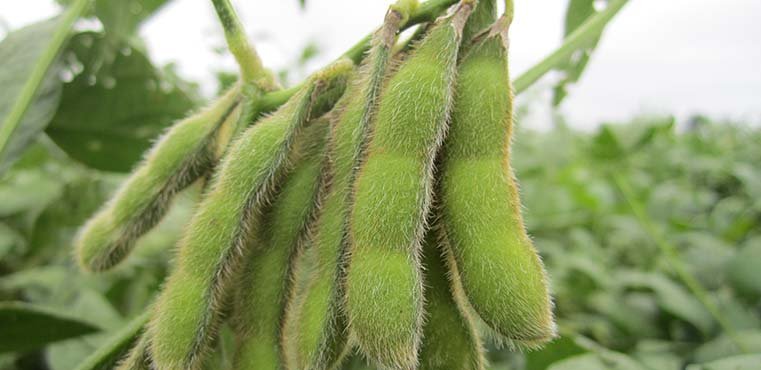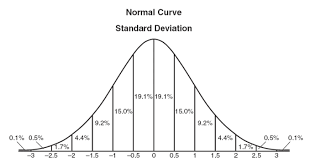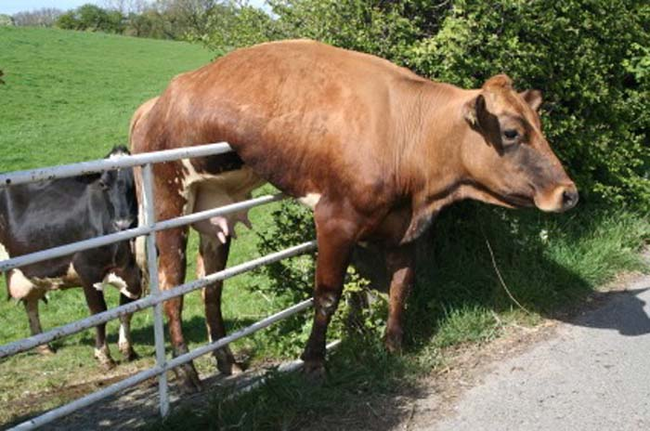
The animal rights movement is nothing new. A lot of the ideas underlying this school of thought originated with Jeremy Bentham (1748-1832). For a host of reasons, Bentham's original ideas, known as "utilitarianism", have gained in popularity over the last years. As I explained in my last post on the subject, I believe the general public is getting increasingly unfamiliar with animal agriculture, and in so doing, has also become more critical of it.

But what are these ideas of Bentham's that survive to this day? Should we give them credence? Are they propelling society forward? And what are other modern-day utilitarians saying about animal-rights? Perhaps the best-known apologist of utilitarianism is Peter Singer, professor of bioethics at Princeton University. He is often quoted by animal rights groups such as PETA, and his arguments seem very appealing at first glance. When you dig deeper, there are some cracks that appear in his reasoning, however. I apologize in advance to my readers who are better versed in philosophy than I am. You might find my thinking somewhat lacking in the rigour that you would expect from a trained philosopher. With this disclaimer out of the way, let us examine the main philosophical arguments against the use of animals for food production.
Harm Reduction
This is probably the most used argument against eating meat. Taking a life constitutes harm, and who would want to harm a sentient being? This argument strikes a chord with many people, and is also displayed in tag lines such as "I choose compassion over taste".
As with most ethical issues, however, the devil is in the details. Before saying that meat constitutes harm, we need to define what harm is. Is it causing pain? Is it taking a life? Using pain and only pain to decide what is morally correct isn't even a slippery slope; it's the mud pit at the bottom. After all, if inflicting pain is the greatest evil there is, then cold-blooded murder is completely justifiable if the means employed are pain-free. Now, pain obviously should be considered when making animal-related ethical choices. However, I will point out that our definition of harm, as in the case of murder, must go beyond pain. Pain can be transient, or it can be chronic. So, the while pain can cause harm, the causes of the pain, the reasons for the pain, and the duration of the pain will all constitute harm to a varying degree.
I will argue, scandalously to some, that taking an animal's life for food does not truly constitute harm. There is little scientific and behavioural evidence to prove that animals make meaning and purpose for themselves in life, and value their lives beyond the biological urge to maintain the species. So, to tie this in with my murder example previously, meat is not murder, because to take a human's life is also to take away the future enjoyment, meaning, and purpose in life that people make for themselves.
On the other hand, although the vast majority of animal rights activists are professional anthropomorphists, there is no solid ethological evidence to suggest that livestock species find meaning in life beyond basic biological functions. But, because animals can feel pain, though, that does mean we are morally obligated to provide them with an environment that is suitable for their species, and that they are slaughtered in a way that minimizes consciousness and pain (cattle, for instance, are slaughtered using a method that is so quick and painless, that it is often used by veterinarians to euthanize sick cows). However, their sentience does not make them human, and it does not mean we are harming them by shortening their lives, since we are not robbing them of future meaning in life.

Furthermore, choosing to consume a plant-based diet to reduce harm is a rather arbitrary position that exists along a wide spectrum of possibilities. The only way to have no impact upon wildlife or animals, as a human, is essentially to not be alive. Animals still get killed in the production of crops, either via machinery, or pest control near fields, or in warehouses and processing facilities. Thus, even when we take up a plant-based diet to limit harm to animals, we are still implying that certain animal deaths are acceptable for the survival of the human species. This simply reflects reality: we live in a physical universe that imposes physical limitations upon us. And while philosophy may present us with a cafeteria menu of ethical positions and choices to choose from, it is less than useful as a guide to action, unless it acknowledges that actions are concrete, rather than abstract, gestures, and are limited by physical realities. This point is particularly important when considering the next argument, the argument of marginal cases.
The Argument of Marginal Cases
This argument, is, in my opinion, the weakest amongst all arguments against meat consumption. In a nutshell, the argument of marginal cases states that every species has a unique property which differentiates it from other species (for instance, rationality and ability to reason). However, all individuals within that species will exhibit this ability to varying degrees, and some will simply not have it. Thus, if we are comfortable with eating cattle because they are not rational, for instance, then we should logically be comfortable with killing humans who are not rational or who lack the mental ability to reason properly. Any other position, is speciesism (try saying that one out loud. Who comes up with these terms anyways?).
There is only one minor issue with this proposition: biology. Variation is a key property of populations. If it weren't, we would have no need for entire fields of science like population medicine, epidemiology, and population genetics. In fact, variation in populations is the main way that species adapt to environmental changes. Not only is variation a key defining factor of populations, but it is also a necessary feature of them to adapt to change and survive. So, the use of "marginal cases", which truly are not marginal but just a normal part of population variation, to suggest speciesism, is not a stroke of philosophical genius, but rather a failure to affirm how nature truly works.

Furthermore, the allegation of speciesism in this case strikes me as ironic. The argument of marginal cases is much more focused on the differences within one species (e.g. people's ability to reason), than it is on the similarities within the species. Yes, there will always be people who are more "gifted" than others intellectually, but the fact that we can look at two people with differing abilities and still affirm their humanity, highlights that they have more in common than they have differences.
In general, we do not define animal genera or families by one single trait, so using only a handful of traits to generate the "marginal cases" used in this argument also does not square with reality. Issues with sexism, racism, any kind of discrimination, really, generally arise when we are much more focused on one or two differences, a handful at most, rather than all the other properties we have in common. So, I find it very questionable to argue that looking at a cow and a mentally disabled person, and concluding they are very different, somehow constitutes speciesism, but that comparing an average Joe Schmuck to a cow and saying that the disabled person is more like a cow than Joe Schmuck, is somehow morally enlightened. Considering that I have rubbed elbows with several mentally challenged people in my life, elderly people who also lost a chunk of their ability to reason, and thousands of cows, I can only qualify this line of reasoning as confused. And even that choice of words requires a huge amount of diplomacy and self-control.
This:

Is not this:

Conclusion
I admit the arguments presented here are not an in-depth treatise on animal welfare, or animal ethics. However, as a veterinary student, I have been exposed to several lines of reasoning in the realm of animal ethics, and believe that many of them fail when the rubber hits the road.
The two main failures in this regards are the "reduction of harm" argument, since it fails to define harm in a way that is consistent with our knowledge of animal behaviour and desires. Furthermore, it assumes that a certain level of animal deaths are acceptable to feed the human population, as collateral damage in crop production. Thus, this argument cannot be used in the way it is most often trotted out, namely to say that killing animals for food is morally unacceptable. It can only be used to argue that we should reduce the animal death toll in agriculture, which then becomes a relative, rather than an absolute argument, and a whole other conversation about which species should be consumed less, and so on.
Lastly, the "argument of marginal cases" fails to recognize that so-called marginal cases are simply a normal part of human population variation. While they might be statistically considered outliers, this does not mean they are any less part of the population, and it also does not imply that they are more comparable to livestock species than they are to fellow human beings, which this argument seems to imply. This line of reasoning further proves that philosophy must not be more abstract than our physical reality, if it is to be used meaningfully in animal ethics and in improving the lives of animals.
Note: photos are not mine, credits available upon request.
Utilitarian philosophy is actually pretty reasonable when it is applied to humans. I had never seen anyone attempt to use it to propagandize animal "rights".
Sigh, now I have to look up WHO is doing that and why they are abusing the philosophy.
In any case, even when we weigh benefit to humans versus "harm" to animals, we have to weight the value of human life far above that of animal life.
As I said in my article, I am not highly versed in philosophy, so I wouldn't know to which extent it has been distorted to fit the narrative of these groups. Perhaps it's because of my background in agricultural science and veterinary medicine, but I can truthfully say that I have only encountered utilitarianism in the context of animal ethics.
I've been to lazy to look it up, but I don't recall anything about Benthem including animals in the matrix.
I've been meaning do a summary of utilitarianism anyway, so I'll post a link here in the comments when it's done.
You're basic point is right though, there is no animal life that has equal value with a human life...well, cept for maybe those PETA folk, if they really want to push the thought LOL
Thanks for pointing that out, @stevescoins. I was unaware that Bentham didn't focus on animals, since I've always heard his ideas referenced in regards to animal rights. I appreciate the clarification and correction, and would love to read any additional information and thoughts you might have on the matter. Please do link your post in the comments when you write it up!
I agree with your statement on the equation of animal and human life - animals are sentient beings, but that leaves us with a responsibility to minimize suffering and treat them well, not an obligation to treat them like a human being and award them the exact same rights as people.
You have that last point exactly right. I can't say definitely that he didn't say anything about animals, but I expect that his position is very similar to what you just said.
I'll make that post manana since it's a bug in my ear now, and I'd like to know for sure myself.
Here go:
https://steemit.com/utilitarianism/@stevescoins/utilitarianism-a-logic-based-morality
Thanks! That was a great read.
So glad you are back and such a good article. Resteemed!
A little off topic, but that first pic looked soooo good! lol Some very valid points In your post though...Thanks @alexbenjalbert:)
I agree that there's no universal ethic against killing animals to eat. My wife and I recently started a largely plant-based diet, one of the reasons we've reduced meat (other than experimenting with supposed health benefits of less meat) is that factory farming and slaughter is pretty disgusting. My personal notion of "harm reduction" is to select "humanely" raised and slaughtered meat, as well as simply reducing the quantity in our diets.
@finpunk: Thanks for your comment. As a veterinary student, one of my career goals is to increase welfare as much as I can on my client's farms. Modern agriculture receives a lot of bad press, but I wish to reassure you that there are many well-meaning people in the industry who do care about their animals, as well as different advisors (e.g. nutritionists, farm consultants, veterinarians), who are constantly trying to improve welfare on farms, regardless of size. I would also encourage you to check out some of the work Dr. Temple Grandin has done on cattle behaviour and welfare, and how it has really shaped the design of slaughter plants.
On the reduction of meat, I think there is a strong and sensible argument to be made that the average North American could do with proportionally less meat and grains and more vegetables and fruits in their diet. However, that is a very different argument than saying we should not eat animals at all, as you correctly pointed out.
Completely agree with you on both counts, and I agree that there are a lot of really good people in agriculture doing their best to reduce suffering; most people are good, in general, so I wouldn't expect less from farmers. It's nice to see growing awareness of inhumane treatment, but i'm not an advocate of eradicating meat from the human diet.
This post has been ranked within the top 80 most undervalued posts in the second half of Dec 03. We estimate that this post is undervalued by $6.22 as compared to a scenario in which every voter had an equal say.
See the full rankings and details in The Daily Tribune: Dec 03 - Part II. You can also read about some of our methodology, data analysis and technical details in our initial post.
If you are the author and would prefer not to receive these comments, simply reply "Stop" to this comment.
Hard to see what rational grounds we could use to justify valuing human life more highly than that of any other animal.
Part of what I described in my post would explain this. As far as we know, animals get some enjoyment out of basic behaviors, but they don't produce meaning in life for themselves. There are sizeable differences in how humans and animals experience the world, and that translates into how we treat them differently. Taking an animal's life does not constitute harm like taking a person's life, because we aren't taking the same thing away from an animal as we are taking away from a person.
Vegetarian who enjoyed your post here. I found your arguments well reasoned, the main sticking point to me was the marginal case argument. I would argue that our preference for and able to differentiate other humans over livestock does not defeat the logic of the marginal case argument. However, neither of the arguments you presented are the primary reason I am a veg. I hope you will consider addressing the environmental impacts of animal husbandry, I'll be there for the discussion if you do!
I enjoyed your post and included it in today’s #philosophy-review https://steemit.com/philosophy/@aaanderson/the-philosophy-review-12-4-2016
@aaanderson: I did write up a post on greenhouse gas emissions, and how they are not the entire story. It's not a comprehensive treatment of the subject, but presents some points which I think should be included in environmental discussions but rarely are. https://steemit.com/academia/@alexbenjalbert/emission-delusion-how-focusing-on-livestock-methane-is-hurting-the-environment-and-society
As for the marginal cases, I semi-agree that the logic is sound. It uses individuals to make statements about how entire species should behave towards each other, which I find is going out on a limb. It compares the extremes of one species - e.g. an extremely intelligent pig, to someone with poor ability to reason, for instance, then makes a generalization that, on the basis of these two extreme examples, the entire species needs to behave a certain way. I don't think that is tenable if you are going to use this argument as a guide to action. In real life, the players are the entire population, with normal variation, not simply the highest and lowest 0.5% of each population. So to be truly sound and consistent, the argument should be made either using individuals and only applied to individuals, or using populations and applied to entire populations. It may make sense on paper, to some people, but it fails, in my opinion, when you try to apply it to biological systems. To be blunt, as a scientist, I honestly don't give a rat's smooth bottom if it's right on paper but we can't use it to solve real-life issues. That's why I think it's a poor argument.
Thanks for following up. I wrote a long thoughtful reply then fatfingered my screen and lost the whole thing! The long and short of it is, i agree with you that there are many important environmental issues that get ignored. However there are still reasons to belive a plant based diet is more sustainable, even beyond greenhouse gasses. I am planning to write a follow up post specifically on this.
For the marginal case, all I can say is that our outlook is different. I don't believe the treatment of an individual should be dependent on the larger group characteristics. At least not to the extent that excuses compete disregard for the individual.
From a practical perpective, i would probably sacrafice a cow life for a human life, but not so i can have it for dinner when i dont have to. Would i sacrafice a cow life to prolong the life of a brain dead human with no hope of recovery? Probably not.
This post has been linked to from another place on Steem.
Utilitarianism - a logic based morality by @stevescoins
The #philosophy Review 12.4.2016 by @aaanderson
Learn more about and upvote to support linkback bot v0.5. Flag this comment if you don't want the bot to continue posting linkbacks for your posts.
Built by @ontofractal
Congratulations @alexbenjalbert! You have received a personal award!
Click on the badge to view your own Board of Honor on SteemitBoard.
For more information about this award, click here
Congratulations @alexbenjalbert! You have received a personal award!
Click on the badge to view your Board of Honor.
Congratulations @alexbenjalbert! You received a personal award!
You can view your badges on your Steem Board and compare to others on the Steem Ranking
Vote for @Steemitboard as a witness to get one more award and increased upvotes!